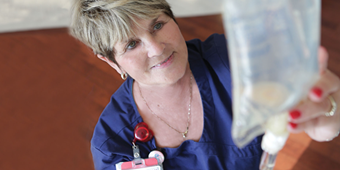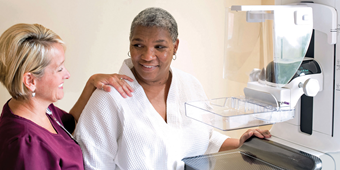The ‘C’-quel You’d Prefer to Miss

Answer a few questions and we'll provide you with a list of primary care providers that best fit your needs.
Hearing the “C” word once is hard enough. When cancer invades your body a second time, the emotions you felt when you were first diagnosed wash over you again. Maybe even more intensely. And new emotions can surface, like guilt, blame and anger.
Understanding what’s behind recurring cancer may help you move toward coping and healing.
Why Does Cancer Recur?
No one knows exactly why cancer returns or why it returns in some people and not others. And just because your cancer recurs doesn’t mean your treatment was wrong or that you did anything wrong.
Cancer recurs when small areas of cancer cells survive treatment undetected. Over time, these cells can multiply and grow. This can happen weeks, months or even years after your primary, or original, cancer was treated.
Cancer recurs when small areas of cancer cells survive treatment undetected. Over time, these cells can multiply and grow.
Does Treatment Differ for Recurrent Cancer?
Recurrent cancer is named for the location your primary cancer began. And if your original treatment was for breast cancer, your recurrent cancer treatment also will be for breast cancer – even if the cancer reappears in another part of the body.
Treatment may differ from your previous treatment and will depend on many factors such as:
- Type of cancer and size
- When and where it recurs
- Length of time between original diagnosis and recurrence
- Aggressiveness of the cancer cell type
- Your age
- Side effects you experienced from the original treatment
- Your overall health
- Your personal values, wishes and treatment tolerance
Tumors that come back often do not respond to treatment as well as the first tumors did.

Your health care team can give you a good idea of what to expect from your new diagnosis, discuss treatment options and their effectiveness, and suggest options for keeping your cancer from growing.
Clinical trials are frequently available to patients with cancer recurrence. It’s wise to spend time understanding the goal of the trial, its chances of helping you, and potential risks and side effects.
Regardless of your treatment path, you should always consider supportive or palliative care. This type of care is not focused on cure. Rather, it will help you manage your symptoms, so you can achieve the highest possible quality of life and comfort.
Tips for Coping with Cancer Recurrence
A second cancer diagnosis can be overwhelming. When the dust settles, you may begin to remember the coping strategies that worked for you before. These tips also may help:
- Stay in close contact and consult often with your health care team.
- Explore and share your feelings and treatment goals with your health care team and family.
- Report intense feelings of sadness, depression or anxiety to your doctor to reduce stress and make it easier to follow your treatment schedule.
- Make your wishes known regarding medical care if you’re unable to speak for yourself (advance directives).
- Focus on ways to maintain hope.
- Join a support group of others facing recurrent cancer.
- Find a support network of family and friends, counselors or members of a faith community (people who will listen).
- Find what gives you joy and seek those activities.
- Find what brings your peace and comfort (prayer, meditation, nature, time with family and friends, journaling) and make time for it.
- Conserve your strength for the things you really want to do.
One of the most important things you can do is to be open and honest with your health care team and loved ones regarding your treatment preferences and goals. Only you can decide how you want to live your life.
Answer a few questions and we'll provide you with a list of primary care providers that best fit your needs.
Source: American Cancer Society; National Cancer Institute, U.S. Department of Health and Human Services; Cancer.Net (American Society of Clinical Oncology)




